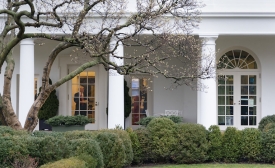america first

"America First" undermines the U.S.'s ability to form constructive global relationships, writes former British diplomat and Boston University Senior Lecturer Paul Hare.
Natural disasters know no political boundaries. And that’s why international humanitarian relief flows so quickly, and in such great and humbling quantities, when hurricanes, earthquakes, and tsunamis strike. But today, with Houston suffering as Mother Nature’s latest victim, will the world’s giving nations step-up and step-in to help American relief efforts?
The problem with “America First” is that it describes an attitude, not a purpose. It substitutes selfishness for realism. It implies that nations can go it alone, that we stand for nothing beyond our immediate self-interest, and that we should give little thought to how the rest of humanity thinks or lives. It suggests that if we are strong enough, we can prosper no matter how much chaos, disorder or injustice surrounds us. America First leads to the diplomacy of narcissism. And narcissism is as unhealthy for nations as it is for people.
Donald Trump was a master at branding in his business career, but he seems to have left those skills in New York. In just a month in Washington, the president has significantly damaged the American brand abroad, in ways that could harm U.S. interests for years. America is not perfect in the eyes of the world. But it is different — and it is seen to be different. Since President Woodrow Wilson framed our entry into World War I as necessary to make the world safe for democracy, American leadership in advancing democratic ideals and global prosperity has been second to none.







